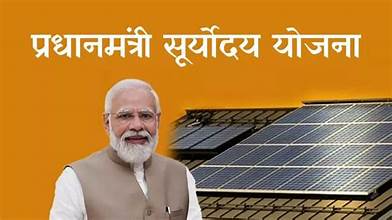PM Suryoday Yojana: In a groundbreaking move, Prime Minister Narendra Modi announced the launch of the Suryoday Yojana, aimed at promoting the installation of solar panels across the nation. Building on this initiative, Finance Minister Nirmala Sitharaman has provided crucial insights into various aspects of the scheme in the Interim Budget 2024. Let’s delve into the details and explore the potential impact on both savings and employment opportunities.
Empowering Families: The Financial Perspective
According to Finance Minister Nirmala Sitharaman, the Suryoday Yojana under the Interim Budget 2024 is expected to enable over 100 million households to save up to INR 18,000 crore annually. The installation of solar panels on rooftops is anticipated to result in a minimum saving of 300 units of electricity per family. This not only translates to significant financial savings for households but also opens up additional income avenues through surplus electricity sales to power companies.
A Green Vision for 2070: Government’s Commitment
Prime Minister Modi, following his return from the Ayodhya Pran Pratishtha program, initially introduced the Suryoday Yojana. Expanding on this scheme, Finance Minister Sitharaman, in her budget speech, revealed the government’s aspiration to achieve the ‘Net Zero’ target by 2070. To realize this vision, the government is actively promoting environmentally friendly energy sources, focusing on both solar and wind energy. In addition to solar energy, the government is allocating additional funds to propel the growth of wind energy sources. It plans to provide funds to government-owned electricity companies for generating 1,000 megawatts through wind energy. Furthermore, the government is poised to support the procurement of essential equipment for the production of biogas.
Employment Opportunities on the Horizon
The Suryoday Yojana, as envisioned by Prime Minister Modi and detailed by Finance Minister Sitharaman, aims to create new employment opportunities in the electric vehicle sector. The scheme anticipates the generation of employment through the supply of energy produced by skilled youth with expertise in managing the supply chain. This not only ensures a sustainable supply of energy but also lays the groundwork for future job prospects in the renewable energy sector.




